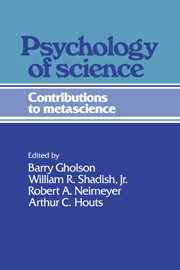Book contents
- Frontmatter
- Contents
- Preface
- Contributors
- 1 The psychology of science: An introduction
- Part I Historical issues in the psychology of science
- Part II The case for a psychology of science
- Part III Creativity and the psychology of science
- Part IV Cognition in the psychology of science
- 10 Cognitive paradigms and the psychology of science
- 11 Historical shifts in the use of analogy in science
- 12 Imagery, metaphor, and physical reality
- 13 A framework for the cognitive psychology of science
- Part V Social factors in the psychology of science
- Part VI Epilogue and Prologue
- Author index
- Subject index
13 - A framework for the cognitive psychology of science
Published online by Cambridge University Press: 05 June 2012
- Frontmatter
- Contents
- Preface
- Contributors
- 1 The psychology of science: An introduction
- Part I Historical issues in the psychology of science
- Part II The case for a psychology of science
- Part III Creativity and the psychology of science
- Part IV Cognition in the psychology of science
- 10 Cognitive paradigms and the psychology of science
- 11 Historical shifts in the use of analogy in science
- 12 Imagery, metaphor, and physical reality
- 13 A framework for the cognitive psychology of science
- Part V Social factors in the psychology of science
- Part VI Epilogue and Prologue
- Author index
- Subject index
Summary
That the psychology of science has produced new knowledge about the nature of the scientific enterprise, and is on the verge of producing even more, is a claim that the reader of this volume will by now appreciate. The emergence of psychology of science is part of the broader trend by which cognitive psychologists are seeking to understand successively richer examples of “natural cognition” (Neisser, 1982). What may be less clear is that the psychology of science is presently in a position to clarify problems and issues that arise within other disciplines. One intent of the present chapter is to argue that such applications are possible if the appropriate strategies are adopted. Specifically, I will argue that we must give careful attention to the exact way in which the scientific findings of the psychology of science are to be used in the interpretation of real-world science. In effect, we must be careful to distinguish between the generation of two kinds of knowledge about science: that which relies upon the usual scientific strategies of experimentation, observation, and the generation and testing of hypotheses; and that which interprets the richness of real science by using concepts derived from the first sort of activities. In the latter case, we must use certain interpretive strategies common to the historical disciplines and to the psychological analysis of complex cognition.
To make the argument, I first describe the general assumptions that I bring to the task. These assumptions are consistent with the work of Wilhelm Wundt, and I use his ideas as a framework and a justification for my own.
Information
- Type
- Chapter
- Information
- Psychology of ScienceContributions to Metascience, pp. 342 - 366Publisher: Cambridge University PressPrint publication year: 1989
Accessibility standard: Unknown
Why this information is here
This section outlines the accessibility features of this content - including support for screen readers, full keyboard navigation and high-contrast display options. This may not be relevant for you.Accessibility Information
- 43
- Cited by
